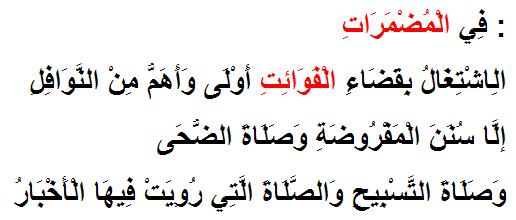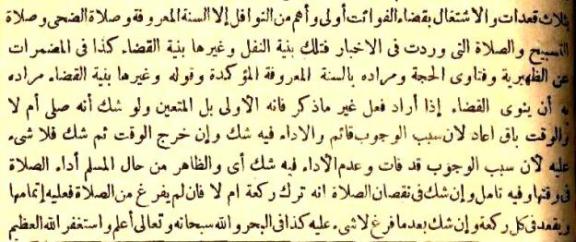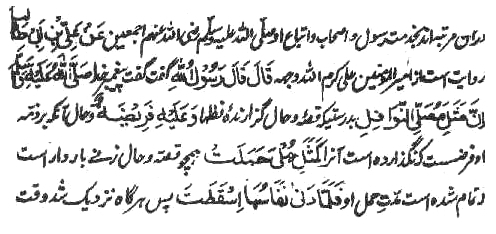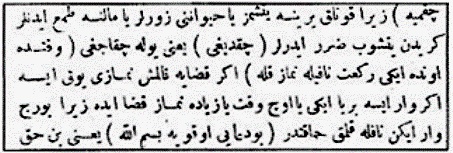Question: It is written in
fiqh books, "It is better to make up one's
qada salats than to perform
nafila salats. However, performing
sunnat salats of the five daily
salats and the other
sunnat salats praised in
hadith-i sharifs, such as
Salat ad-Duha,
Salat at-Tasbih,
Tahiyyat al-Masjid,
Salat al-Awwabin, and
Salat at-Tahajjud, is better than making up
qada salats." Then why do you say that a person who has
qada salats cannot perform
sunnat salats?
ANSWER
[To carry out a
salat within its prescribed time period is called
adaa. To carry it out after its prescribed time has ended is called
qada. Throughout this article, we will use the verb
make up to mean to do
qada of a
salat.]
In
fiqh books, not the phrase "the
salats that were abandoned" but the phrase "the
salats that were made
fawt" appears. The statements that you mentioned in your question apply to those who made
fawt of their
fard salats, that is, who missed them unintentionally due to an excuse. For a few
salats missed in this way, the
fiqh books say that one should not make up these
salats by skipping
sunnat salats but should perform them separately. There is no need to perform a few
qada salats that one missed due to an excuse in lieu of
sunnat salats because just as it is not a sin to miss a
fard salat due to an excuse, so it is not a sin to delay making it up as much as the time allotted for the performance of
sunnat salats. However, missing a
fard salat due to an excuse (that is, making
fawt of it) is different from abandoning it (that is, not performing it intentionally without an excuse and out of laziness). The former is not sinful while the latter is a major sin. They are pole apart. It is very wrong to consider these two as the same.
The phrase "Making up
faita salats [the
salats that were missed due to an excuse]" appears in the
fiqh books of the
Hanafi Madhhab. It is not written "Making up the
salats that were abandoned" in them because a Muslim does not abandon
fard salats deliberately. He/she only makes
fawt of them due to an excuse, such as negligence (
ghaflah), sleeping, and forgetting. In the
madhhabs of
Shafi'i and
Maliki, a Muslim who abandons a
fard salat is killed as a punishment. In the
Hanbali Madhhab, such a person is killed because he is considered an apostate. In the
Hanafi Madhhab, a person who abandons
salat is imprisoned. This shows the importance of
fard salats. It is in no way permissible to delay making up one's
omitted salats by performing
sunnat or
nafila salats.
Hadith-i sharifs say:
(A person who abandons a fard salat deliberately is a disbeliever.) [Tabarani]
(Whoever abandons the five daily salats will be destitute of Allah's protection and security.) [Ibn Majah]
(A person who does not perform salat has no religion.) [Bazzar, Ibn Nasr]
(Whoever abandons salat, Allahu ta'ala will not accept his other acts of worship.) [Isfahani, Abu Nu'aym]
This being the case, how can
fard salats be compared with
nafila salats? In all of the four
madhhabs, one who has
fard salats to make up is not allowed to perform
sunnat or
nafila salats. It is written in all reliable books that
sunnat salats, too, come under the heading of
nafila salats.
If one does not perform, even once in a lifetime, the
salats that are highly praised in
hadith-i sharifs, such as
Salat ad-Duha,
Salat al-Awwabin, and
Salat at-Tahajjud, one will not be questioned about them in the Hereafter as to why one did not perform them. However, if one neglects to do a
fard act of worship, one will be questioned about it because one has committed a major sin. It is idiocy, as scholars stated, to delay a
fard act of worship, which must be performed, and to busy oneself with
nafila ones.
Perform a two-
rak'at salat before going on a journey. If you have
salats to make up, then you must make up two or three
salats because it is idiocy to perform voluntary
salats when one has
salats to make up.
(The pamphlet
Bay wa Shir'a)Sayyid Abd al-Qadir Ghaylani stated:
The
hadith-i sharif "If a person has a missed fard salat, his performing voluntary salat is like [the case of]
a pregnant woman who has a miscarriage when she is about to give birth to the baby. The woman cannot be said to be pregnant, nor can she be called a mother anymore. So is this person. Unless he makes up his missed salats, Allahu taala will not accept his voluntary salats," which was reported from Hadrat Ali, shows that it is idiocy to spend time performing
nafila salats while one has
salats to make up. A person performing
nafila salats while he/she has debts of omitted
salats is like a debtor taking a present to the person to whom he/she owes, which, normally, is not acceptable. A Believer is like a business person. The
fard salats are his/her capital, and voluntary
salats are his/her profit. Unless the capital is rescued, they will give no profit.
(Futuh al-Ghayb)It is stated in a
hadith-i sharif:
(The nafila salat of a person who has a fard salat to make up will not be accepted.) [Durrat-ul-Fakhira]
Hadrat Abu Bakr said the following in his will to Hadrat 'Umar:
If you carry out in the daytime the rights of Allah that you must do at night or if you carry out at night the rights of Allah that you must do in the daytime, He will not accept them. He will not accept your voluntary acts of worship unless you do those acts of worship that are
fard on you.
(Kitab-ul-Haraj)
Some original texts from
fiqh books in which the word
fawait appears are as follows:
1. Radd-ul-Mukhtar:

2. Tahtawi:

3. Futuh al-Ghayb:

4. The Pamphlet
Bay wa Shir'a:






